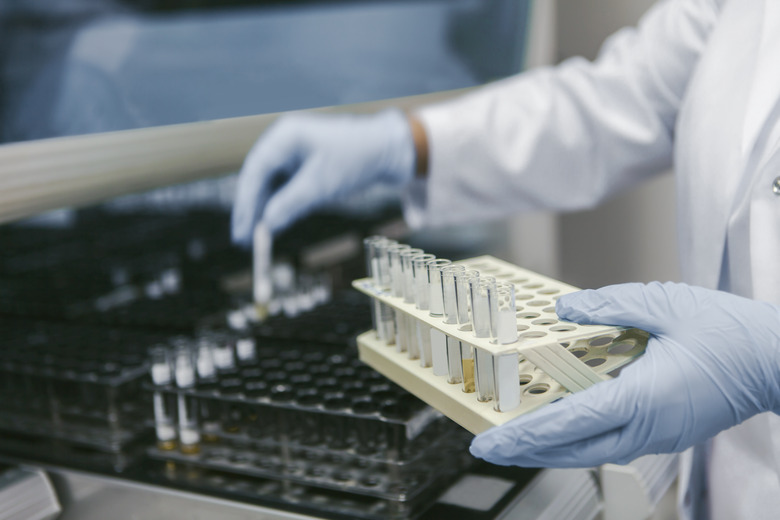Disadvantages & Advantages Of An HPLC
HPLC offers a quick, automated and highly accurate method to identify certain chemical components in a sample, but it can be costly, complex and doesn't work for all samples. Medical, forensic, environmental and manufacturing labs use the technique to quantify and separate the chemicals in a sample. HPLC has both advantages and disadvantages compared with other techniques.
HPLC and Similar Techniques
HPLC and Similar Techniques
Like other forms of chromatography, HPLC allows the separation of chemical constituents through the use of a mobile phase and a stationary phase. The mobile phase is liquid and the stationary phase is solid. Because the different components move at different speeds they separate from each other. Alternative techniques include capillary electrophoresis, where substances migrate through solutions in an electric field, and other chromatographic methods such as solid phase extraction, gas chromatography and thin layer chromatography.
Speed, Efficiency and Accuracy
Speed, Efficiency and Accuracy
Compared to other chromatographic techniques, such as TLC, HPLC is extremely quick and efficient. It uses a pump, rather than gravity, to force a liquid solvent through a solid adsorbent material, with different chemical components separating out as they move at different speeds. The process can be completed in roughly 10 to 30 minutes, and it delivers high resolution. It is accurate and highly reproducible. Because it is largely automated, basic HPLC runs can be performed with minimal training.
Cost and Complexity
Cost and Complexity
Despite its advantages, HPLC can be costly, requiring large quantities of expensive organics. Techniques such as solid phase extraction and capillary electrophoresis can be cheaper and even quicker, especially for analysis under good manufacturing practice. Although it is relatively easy to use existing HPLC methods, it can be complex to troubleshoot problems or to develop new methods. This is largely because of the array of different modules, columns and mobile phases.
Sensitivity and Resolution
Sensitivity and Resolution
In general, HPLC is versatile and extremely precise when it comes to identifying and quantifying chemical components. With many steps involved, the precision of HPLC is largely down to the process being automated and therefore highly reproducible. HPLC does have low sensitivity for certain compounds, and some cannot be detected as they are irreversibly adsorbed. Volatile substances are better separated by gas chromatography.
Cite This Article
MLA
Smith, Clare. "Disadvantages & Advantages Of An HPLC" sciencing.com, https://www.sciencing.com/disadvantages-advantages-hplc-5911530/. 13 March 2018.
APA
Smith, Clare. (2018, March 13). Disadvantages & Advantages Of An HPLC. sciencing.com. Retrieved from https://www.sciencing.com/disadvantages-advantages-hplc-5911530/
Chicago
Smith, Clare. Disadvantages & Advantages Of An HPLC last modified March 24, 2022. https://www.sciencing.com/disadvantages-advantages-hplc-5911530/
